 Multiple studies confirm that higher taxes often lead to a drop in consumption of tobacco.
Multiple studies confirm that higher taxes often lead to a drop in consumption of tobacco.
Revenue from tobacco taxes in Kenya has actually reduced by nearly half in the last ten years when inflation is taken into account, the World Bank has said.
The bank said all tobacco taxes amount to just 17 per cent
of the total annual health taxes, also called sin taxes, in Kenya.
“Currently, health taxes generate meaningful – but declining – tax revenues in Kenya. Alcohol and tobacco tax revenues have declined by 6 and 39 percent respectively, in real terms, between 2016 and 2023,” the bank said.
A 39 per cent decline in real terms means that even if the government is collecting more money on paper, the value of that revenue (what it can actually buy or fund) has dropped by nearly 40 per cent, mainly due to inflation.
The World Bank has now advised Kenya to raise taxes on tobacco and other harmful products that include alcohol and sugar sweetened beverages (SSB).
Since 2016, only soft drink tax revenues have increased in
real terms, by 47 percent over the same period, albeit from a much lower base.
Currently, most revenues from sin taxes come from alcohol, which generates 73 per cent of health tax revenues (73 percent), while tobacco and soft drinks generate significantly lower shares of the total revenues (17 and 10 percent respectively).
“The decline in health tax revenues is steeper and more concerning when the revenues are measured as a share of GDP, with the combined share declining from 0.67 to 0.46 percent of Kenya’s GDP between 2016 and 2023, about half the global average of 0.9 percent of national GDP,” the Bank said.
Health taxes are levied on products linked to major public health burdens such as cancer, heart disease, diabetes, other diseases and death.
For instance, tobacco has absolutely no known health benefit
and kills about 9,000 Kenyans every year, according to the Ministry of Health.
Its use also leaves thousands sick with cancer, heart complications, and other non-communicable diseases.
On the other hand, alcohol use kills 14,000 Kenyans every year, according to the World Health Organization.
"Higher excise taxes on alcohol, tobacco and sugar are low-hanging fruit," said Thomas Lindi, the CEO of the Kenya Tobacco Control and Health Promotion Alliance (Ketca). "They simultaneously improve health, save lives, and raise revenue."
 Thomas Lindi, the CEO of the Kenya Tobacco
Control and Health Promotion Alliance (Ketca).
Thomas Lindi, the CEO of the Kenya Tobacco
Control and Health Promotion Alliance (Ketca).Ketca and the Nairobi-based legal thinktank the International Institute of Legislative Affairs (IILA), among other non-profits, appeared before the Finance and National Planning Committee recently and argued for higher health taxes.
“We asked the committee to consider a progressive approach to tobacco taxes. We called for taxes on electronic cigarettes to be increased by 20 per cent or more. We also asked for tax on liquid nicotine to be increased to Sh200 per millilitre, up from Sh100,” said Celine Awuor, the CEO of IILA.
She also called for inflation adjustment.
"Following the repeal of the inflation adjustment provision in the Excise Duty Act via the Finance Act of 20232, excise taxes on tobacco products are not adjusted to inflation, hence the value of the excise and price of tobacco products becomes eroded over time, making the products affordable over time. This is dangerous as it erodes the efforts and essence of tobacco taxation as a public health measure," Awuor said.
Benjamin Odhiambo, a programme officer with the Students Campaign Against Drugs (Scad), also called the current tax rates on tobacco as "grossly inadequate," especially when compared to global best practice.
Scad is a non-profit that leads drugs and alcohol abuse prevention
programmes within schools and communities
"WHO recommends that excise taxes make up at least 75 percent of the retail price of tobacco. In Kenya, it's less than that," he said.
The World Bank estimated that effective implementation of health taxes could raise over Sh90 billion annually.
It said Kenya currently collects below potential, and recommended an immediate tax adjustment, followed by regular inflation-indexed increases.
Kenya currently also lacks a dedicated excise duty specifically on sugar-sweetened beverages. While the government does levy an excise tax on soft drinks, it applies to all soft drinks, including those with and without sugar, at a rate of Sh10 per litre. This tax is intended as a revenue generation strategy, not a targeted measure to address non-communicable diseases related to sugar consumption.
The 2025 Finance Bill remains silent on the matter. This stands in contrast to the World Bank’s recommendation that Kenya urgently implement an SSB tax to combat rising obesity and diabetes rates.
Non-communicable diseases now account for more than half of hospital admissions in Kenya and roughly 39 percent of all deaths, according to the Ministry of Health (MoH).
"We are paying for cheap sodas with expensive dialysis," said Odhiambo.
 Celine Awuor, the CEO of the International Institute of Legislative
Affairs (IILA).
Celine Awuor, the CEO of the International Institute of Legislative
Affairs (IILA).Kenya’s beverage and tobacco industries have pushed back against proposals to raise taxes, arguing that doing so would fuel job losses, illicit trade, and hurt small retailers. The Alcohol Beverages Association of Kenya (ABAK) earlier this year claimed that higher taxes could worsen the illicit alcohol crisis.
He released an alcohol industry-led study that alleged that illegal alcohol now accounts for 60 per cent of total alcohol consumption in Kenya.
This includes both traditional homebrews such as chang’aa and busaa, as well as counterfeit and smuggled commercial spirits.
“The study has established that higher alcohol taxes are pushing more people toward cheaper, illegal options,” ABAK Chairman Eric Githua told the media mid last month.
Cigarette manufacturer BAT also claims higher taxes make cigarettes expensive and drive people to alternative products.
However, evidence from other countries challenges these claims.
Evan Blecher, a World Bank consultant and global expert on
health taxes, says multiple studies confirm that taxes often lead to a drop in
consumption of tobacco, alcohol and sugar sweetened beverages.
“Contrary to a common critique of health taxes, empirical studies in a variety of low and middle income countries show that increasing tobacco and SSB taxes are likely to result in progressive, rather than regressive outcomes, once behavioral responses to price shocks are accounted for, as poorer households reduce consumption of these products relatively more as prices rise,” he said in a paper, Why Health Taxes Matter: A Mechanism to Improve Health and Revenue Outcomes.
Kenya has made significant strides in reducing tobacco use, with prevalence declining from 12 per cent in 2014 to 9 per cent in 2022, and 8.5 per cent in 2022 among adults aged 15-65, according to MoH.
This is due to a combination of factors, including taxation, smoke-free policies, and banning tobacco advertising, promotion, and sponsorship. However, Kenya is now facing challenges with the rise of nicotine and emerging tobacco products such as nicotine pouches, vapes, and electronic cigarettes.











